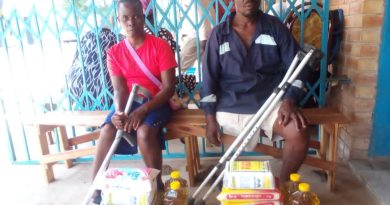Omalayitsha: The vital link between ART, diaspora clients
FOR Ms Deliwe Dube* (37), accessing Antiretrovirals (ARVs) from Zimbabwe while residing in South Africa has been life-saving.
Since 2015, she has been able to consistently take her medication thanks to her mother, who collects and sends the drugs via omalayitsha — transporters of people and goods across borders — ensuring her continued treatment.
Omalayitsha and bus drivers serve as critical links in the healthcare chain for Zimbabweans living in neighbouring countries like South Africa and Botswana, many of whom face difficulties accessing ARVs due to legal, logistical or documentation challenges.
Undocumented individuals, in particular, often rely on loved ones back home to secure and send their medication through these transporters.
“I collect ARVs for my daughter at Chinamasa Clinic in Chiwundura,” Mrs Dorah Dube explained.
“She lives in Johannesburg and visits home every December. Since she has been in South Africa since 2010, I pick up her ARVs every six months and send them via transporter. The last batch I sent was in August, ensuring she has supplies until February 2026.”
This was shared during an HIV Community ART Monitoring engagement organised by the National Aids Council in Vungu District last week.
Deliwe was diagnosed HIV-positive in 2015 at a local Zimbabwean clinic and has since been on ARV treatment.
Her mother, Mrs Dube, manages the logistics of collecting her medication and ensuring its delivery via trusted transporters.
“The process is straightforward, I collect the ARVs from the clinic here, then meet a driver in Gweru, who takes them across the border directly to my daughter,” Mrs Dube said.
“She pays for the transport when the tablets are delivered. I don’t know the exact cost, but I use a reliable transporter each time.”
Mrs Dube emphasised that the cross-border arrangements have saved lives — both her daughter’s and others’ — by enabling continued access to essential treatment despite the challenges of living abroad without proper documentation.
“It’s reassuring that my daughter can access ARVs in South Africa. Many struggle to get treatment there, especially if they lack legal papers. I’m grateful she hasn’t defaulted, thanks to our arrangements,” she added.’
“Sadly, some who test positive and receive initial supplies never return to Zimbabwe to plan for continued care, leading to preventable deaths.”
The local clinic in Chiwundura has developed a supportive system that facilitates these cross-border exchanges. Nurses are familiar with Mrs Dube and co-ordinate to ensure her daughter’s ongoing care, including cervical cancer screenings and other health services.
Deliwe even communicates with the clinic via WhatsApp, to send test results and stay updated on her health status.
“The Ministry of Health and Child Care, along with NAC, has made cross-border ART access more seamless,” Mrs Dube said.
“They allow us to collect and send ARVs through buses and omalayitsha, reminding us when to prepare and ensuring timely delivery. The transporter knows their schedule and pickup points, making the process efficient.”
She expressed pride in the strong relationships built with the clinic staff, which contribute to the survival of children like Deliwe.
“Many others come back via omalayitsha in worse health, unable to access ARVs in South Africa or Botswana and sadly, some succumb. We must ensure others don’t face the same fate,” she urged.
Mrs Dube lives with Deliwe’s children — born HIV-negative after her diagnosis as she took precautions to prevent mother-to-child transmission.
Sister Flora Madziva, the Sister-in-Charge at Chinamasa Clinic, confirmed that they dispense ARVs for clients outside Zimbabwe, including those in Botswana and South Africa.
They update patient records based on personal visits or communication and co-ordinate testing schedules, such as viral load monitoring and cervical cancer screening.
“Some clients give us their record books to update remotely,” Sister Madziva added.
“However, since some are not documented locally, we often wait until December when they visit home to perform necessary tests and update their records.
We also encourage them to do tests locally and send results via mobile messaging to avoid missed appointments.”
She highlighted that flexibility in providing medication to relatives or parents for delivery helps prevent treatment interruptions, which are costly and detrimental to health.
The cross-border system exemplifies how innovative, community-based solutions can bridge healthcare gaps for diaspora populations, ensuring continuity of life-saving ART treatment despite geographical and legal barriers. Sunday News




